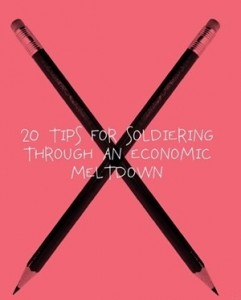By Gaye Levy
Contributing Writer for Wake Up World
A few years ago, I wrote about our deteriorating economy. As I recall, my words were “current lousy economy”. The good news is that so far, a global economic ‘meltdown’ has been abated. And the bad?
From what I can determine by simply opening my eyes and looking around, we are nowhere near the recovery that politicians and the economists in their hip pocket are touting. If anything, we are barreling forward to a collapse not unlike the big crash of 1929.
I say this without intending to invoke fear. Quite the contrary. Living in fear is simply not my thing. Surviving an economic collapse is something that I will do by continuing to build up my supplies, skills and knowledge so that I can soldier through whatever is tossed my way.
So How Bad is Bad?
Who is to say? I am lousy at textbook economics. I prefer to look around and be observant of the families around me. I watch what people are putting into their grocery carts and mostly, I read all of the comments and emails that are sent to me from readers around the world…
I see a lot of financial downsizing. I see people making the decision to pay for food or for medicine, but not for both. I also see vacant storefronts while the thrift stores are doing a booming business. Most of all I see a thirst for learning how to do things the “old fashioned way” or like the Amish, the Native Americans, or our grandparents during the great depression.
I read things like 10 Stories From The Cold, Hard Streets Of America That Will Break Your Heart and my heart does indeed break. It is almost as though poverty and suffering have become invisible to those in power, from elite and ‘upper class’ circles.
To many of us, the economic future looks bleak.
Why? Here are some of the reasons:
- There is a continued lack of employment opportunities for those that are currently unemployed of underemployed. Or, sad to say, old of age but not of spirit.
- Droughts, freakish storms and other natural disasters are affecting the viability of farmlands resulting in increased costs for for food.
- Out of sight fuel costs affect transportation and heating costs.
- The cost of health insurance, for many, has doubled if not tripled.
- Devaluation of homes and real property continues in many parts of North America.
- Cities are declaring bankruptcy and reneging on public employee pensions.
- Crimes against persons (knifings, murders, even road rage) indicate a barometer of frustration and malcontent among citizens in almost every modern, first world country.
These are just a few indications that an economic meltdown could be on its way. And since I am an economics knucklehead, I won’t get into the technical reasons having to do with the way monetary policies affect the economy. To me, the anecdotal and real-time experiences with real people are good enough. Oh sure, there are pockets of economic growth here and there. But for the most part, I see and sense a feeling of helplessness and hopelessness when it comes to money and matters relating to the economy.
What to do?
Prepping and learning to become self-sufficient are a good start. The problem, though, is that you can store water and food, stow away some cash or even gold, and insulate yourself from short-term off grid situations. But what happens if the economic meltdown lasts longer than six months, or a year?
20 Tips for Soldiering Through an Economic Meltdown
I feel that the only solution is to embrace a lifestyle where consumption is kept to a minimum. And to that end, here are some tips that I have been noodling around – in no particular order:
1. Reduce housing costs.
This may mean taking in boarders or sharing your home with extended family members. Are you renting a large home or large apartment? Take it down a notch.
2. Manage food costs.
Stock up when you see a great sale. Double up and by two instead of one, or three instead of two, and so on.
3. Create a mini-store
Create a mini-store in your own home and shop from your own supplies. Your pantry will become your friend when money or supplies are short. Don’t forget sundry items and personal items as well as food when it comes to stocking your home based mini-market.
4. Only purchase foods that you will eat.
This is related to #3 above. Don’t purchase canned Spam if you will not eat it. That is just silly.
5. Limit eating out.
With a little planning, you won’t suffer the “nothing in the house to eat” syndrome. Limit eating out. If you want celebrate a special evening, go for a desert and coffee date instead of dinner.
6. Reduce the number of vehicles you own.
Do you really need a fleet with the associated costs of insurance and maintenance? Instead of an expensive vehicle, get yourself a scooter or motorcycle as a second vehicle and be smug at getting 60 mpg. Better yet, walk or bike instead of driving your car.
7. Purchase used goods.
Go to garage sales and thrift shops. Or, if that is not your thing, you can find some steals on Craigslist or Ebay. I am not suggesting that you purchase everything used, but think about your purchases and when practical, buy used and pocket the change.
8. Become self-entertaining.
Read (use the library for heaven’s sake), watch DVDs (same thing, the library is a great source), find some puzzles you enjoy, hike, bike, dance. There are many things you can do to entertain yourself while spending very little money.
9. Reduce communications costs.
Now tell me, do you really need 100 cable channels? And what about that smartphone that is costing $150 a month. Scale back now as a test; you can always add the extra services – and costs – back later if you simply “have to” have them. (Preaching here; I know.)
10. Earn extra income.
Sell your unused stuff on Ebay. Get a part time job if you have a skill. Flip burgers. Become a sales clerk or a barista. Do yard cleanup. Anything to bring in a few extra bucks.
11. Barter.
Barter your time for goods or services. Walk dogs, water plants, help out with someone’s garden. Be creative.
12. Grow food.
This does not take up a lot of space (as I have recently learned). Practice Square Foot Gardening and you will be amazed at how much you can grow in a tiny area.
13. Use what you have.
Become Ms. and Mr. Fix-it and make repairs instead of buying new. Find new uses for old things. [For some handy tips, see 12 Tips to Use It Up, Wear It Out and Make It Do].
14. Avoid debt.
If cash is short this week, wait until next week. Live within your means even it means that you will eat beans and rice for a few days. Put a moratorium on clothing purchases for one season.
15. Secure the homestead.
Do everything you reasonably can to make sure you and your supplies are safe.
16. Have an escape plan.
I am a big believer in the concept of sheltering in place, but if you need to evacuate, be ready. Have a plan so all family members know how to communicate with each other and where to meet. Learn about escape routes in your area and practice getting out of dodge.
17. Stay healthy.
Eat good food and not a lot of junk. Get physical exercise and try to maintain a decent weight.
18. Be a nice person.
Treat those that are less fortunate with respect and be mindful that hard times may affect their behavior. Be friendly and neighborly and do not shun them because they are down and out. Remember, under different circumstances, it could be you that has fallen upon bad fortune.
19. Save your pennies.
Recognize that frugal is not a dirty word. It is a smart word. Frugal is not being cheap, it is being sensible. Being frugal now will allow you to get the most mileage out of your funds with something left over for a rainy day – or for the day when an economic meltdown occurs.
20. Prepare your mindset.
If you plan for the worse and it never happens, be joyful. On the other hand, if you plan for the worse and you are prepared, you will reduce the possibility of panic in the short term and depression in the long term.
The Final Word
So there you have it. This is the lifestyle design that I currently embrace, not so much because I am worried and afraid, but because I don’t want to be worried and afraid. I want to be able to enjoy life and I plan to do so by learning to do things instead of buying things, learning to smell the roses, and learning to enjoy the simple pleasures provided by a walk along the water with my husband and my dog.
Our world and our society is changing. Don’t be left behind because you forgot to prepare for a time when frugality becomes the norm.
Enjoy your next adventure through common sense and thoughtful preparation!
Gaye
Further articles by Gaye Levy:
- 72 Ideas That Will Simplify Your Life
- A Big Fat List of Essential Oils for Health and Survival
- 8 Tips for Storing Seeds for the Long Term
- 33 Awesome Uses of Lemon Essential Oil for Home and Health
- Six Ways to Get Ready for Going Off-Grid
- DIY Miracle Healing Salve
- The Powerful Healing Qualities of Rosemary Essential Oil
- 15 Alternative Uses for Honey
- Vermiculture: How To Build A Worm Bin the Cheap and Easy Way
- 21 Home Remedies for a Toothache Emergency
- The Miracle of Tea Tree Oil: 80 Amazing Uses for Survival
- 10 Simple Steps Toward Self-Sufficiency
- Creating a Healing Garden: 9 Healing Herbs You Can Grow Yourself
About Gaye Levy:
 Gaye Levy, also known as the Survival Woman, grew up and attended school in the Greater Seattle area. After spending many years as an executive in the software industry, she started a specialized accounting practice offering contract CFO work to emerging high tech and service industries. She has now abandoned city life and has moved to a serenely beautiful rural area on an island in NW Washington State.
Gaye Levy, also known as the Survival Woman, grew up and attended school in the Greater Seattle area. After spending many years as an executive in the software industry, she started a specialized accounting practice offering contract CFO work to emerging high tech and service industries. She has now abandoned city life and has moved to a serenely beautiful rural area on an island in NW Washington State.
Through her website at BackdoorSurvival.com, Gaye lives and teaches the principles of a sustainable and self-reliant lifestyle, speaking her mind and delivering her message of prepping with optimism and grace, regardless of the uncertain times and mayhem swirling around us. Gaye is also the author of 2 kindle books, The Prepper’s Guide to Food Storage and 11 Steps to Living a Strategic Life, available now on Amazon.com
You can connect with Gaye through her website BackdoorSurvival.com, and on Facebook, Twitter and Pinterest.
If you have not done so already, sign up to receive Gaye’s email updates you will receive a free, downloadable copy of her e-book The Emergency Food Buyer’s Guide.

If you've ever found value in our articles, we'd greatly appreciate your support by purchasing Mindful Meditation Techniques for Kids - A Practical Guide for Adults to Empower Kids with the Gift of Inner Peace and Resilience for Life.
In the spirit of mindfulness, we encourage you to choose the paperback version. Delve into its pages away from screen glare and notifications, allowing yourself to fully immerse in the transformative practices within. The physical book enriches the learning process and serves as a tangible commitment to mindfulness, easily shared among family and friends.
Over the past few years, Wake Up World has faced significant online censorship, impacting our financial ability to stay online. Instead of soliciting donations, we're exploring win-win solutions with our readers to remain financially viable. Moving into book publishing, we hope to secure ongoing funds to continue our mission. With over 8,500 articles published in the past 13 years, we are committed to keeping our content free and accessible to everyone, without resorting to a paywall.







